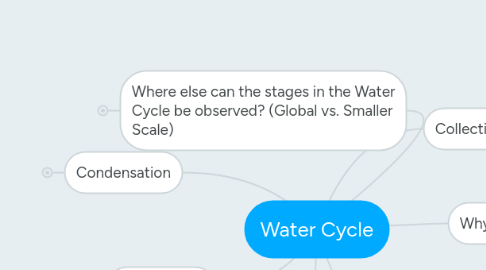
1. Condensation
1.1. State
1.1.1. Water vapor in the air gets cold and changes back into liquid, forming clouds
1.2. When does it occur?
1.2.1. As water vapor in the clouds cools down it becomes water again
1.3. Where does it occur?
1.3.1. The nature of water requires that there be a surface upon which water can condense
2. Precipitation
2.1. Forms
2.1.1. Rain
2.1.2. Hail
2.1.3. Freezing Rain
2.1.4. Sleet
2.1.5. Snow
2.2. When does it occur?
2.2.1. Cloud particles become too heavy to remain in suspended air --> fall to earth
2.2.2. Occurs when so much water has condensed that the air cannot hold it anymore
2.3. What is it?
2.3.1. Water in either solid or liquid form that falls from Earth's atmosphere
2.4. State
2.4.1. Liquid
2.4.2. Solid
2.5. Where does it occur?
3. Where else can the stages in the Water Cycle be observed? (Global vs. Smaller Scale)
3.1. Condensation
3.1.1. Formation of water droplets on the outside of a cold drink. (When the cold drink is left sitting on a table, the moisture (water vapor) in the room's air comes in contact with the cold bottle or glass, cools, and condenses on the drink's outside.)
3.2. Evaporation
3.2.1. Boiling a pot of water
4. Processes of Science
4.1. Make predictions
4.2. Ask questions
4.3. Describing
4.4. Inferring
4.5. Making generalizations
5. Evaporation
5.1. When does it occur?
5.1.1. Sun heats up water in rivers or lakes or the ocean and turns it into vapor or steam
5.2. Where does it occur?
5.2.1. Rivers
5.2.2. Lakes
5.2.3. Oceans
5.3. State
5.3.1. Liquid substance becomes a gas.
5.4. Where does it go?
5.4.1. Once water evaporates, it also helps form clouds
6. Collection
6.1. What is it?
6.1.1. When water falls back to earth as precipitation, it may fall back in the oceans, lakes or rivers or it may end up on land. When it ends up on land, it will either soak into the earth and become part of the “ground water” that plants and animals use to drink or it may run over the soil and collect in the oceans, lakes or rivers where the cycle starts
6.2. Where does it occur?
6.2.1. Oceans and lakes collect water that has fallen

